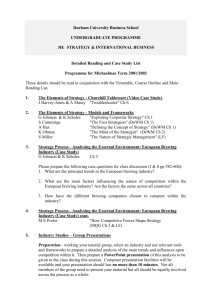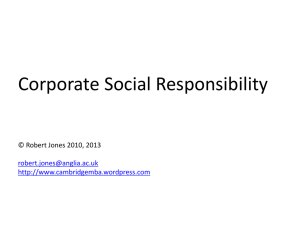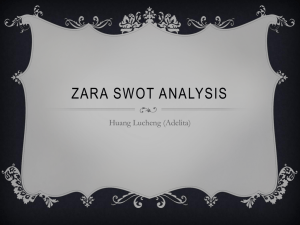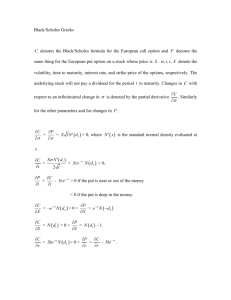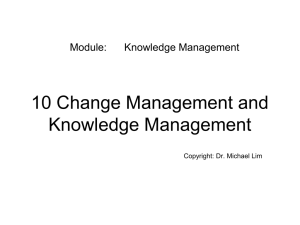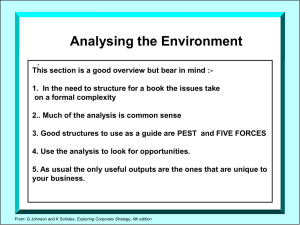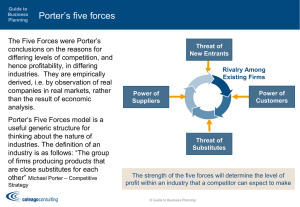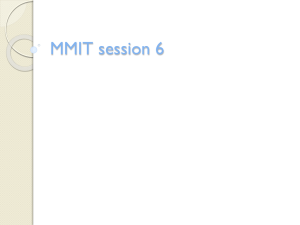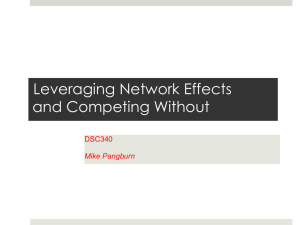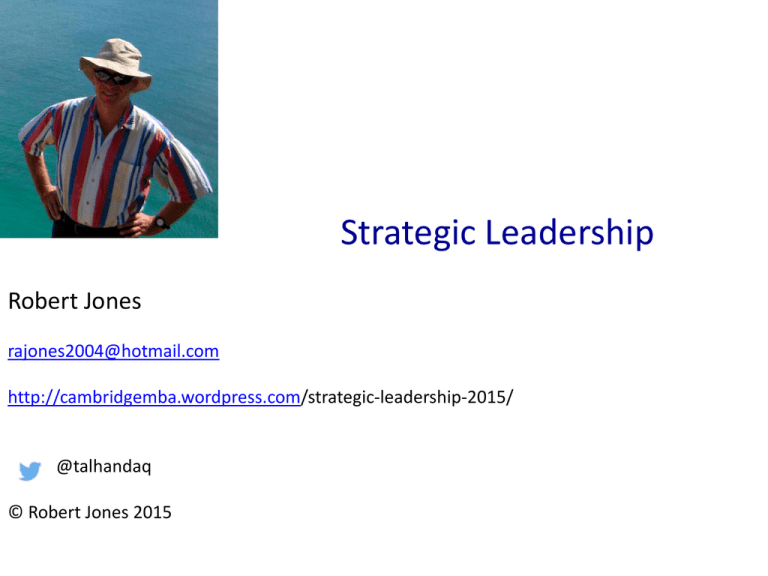
Strategic Leadership
Robert Jones
rajones2004@hotmail.com
http://cambridgemba.wordpress.com/strategic-leadership-2015/
@talhandaq
© Robert Jones 2015
Chatham House Rule
When a meeting, or part thereof, is held under the Chatham House Rule,
participants are free to use the information received, but neither the
identity nor the affiliation of the speaker(s), nor that of any other
participant, may be revealed.
http://www.chathamhouse.org/about/chatham-house-rule
Our starting point today:
What is strategy?
Discuss (briefly) and we will define
Definition of Strategy
Strategy is the direction and scope of an
organisation over the long term, which
achieves advantage in a changing
environment through its configuration of
resources and competences with the aim
of fulfilling stakeholder expectations.
Johnson & Scholes (2005)
Your own experience of making “strategic” decisions
Strategic Decisions are Likely to :
Be complex in nature
Be made in situations of uncertainty
Affect operational decisions
Require an integrated approach (both inside and outside an
organisation)
Involve considerable change
The context of strategy –
Layers of the business environment
Exhibit 2.1
Johnson & Scholes (2005)
The vocabulary of strategy
Exhibit 1.2
Johnson & Scholes (2005)
A model of the elements of strategic management
Exhibit 1.3
Johnson & Scholes (2005)
Strategic Leadership session 1
Internal Business Environment 1
Evaluate a wide range of approaches and models
In the evaluation of the internal business environment
Internals - the basics
Input / process / output
What are you delivering (outcome)?
The Value Chain
γνῶθι σεαυτόν gnōthi seauton
The Value Chain
Source: M.E. Porter, Competitive Advantage: Creating and Sustaining Superior Performance, Free Press, 1985. Used with permission of
The Free Press, a division of Simon & Schuster, Inc. © 1985, 1988 by Michael E. Porter. All rights reserved.
Exhibit 3.6
Johnson & Scholes (2005)
Strategic Capabilities and Competitive Advantage
Exhibit 3.1
Johnson & Scholes (2005)
Competence
physical, financial, human and intellectual
resources
Competence
Competence
http://etc.usf.edu/clipart/13100/13110/bundlesticks_13110_lg.gif
Competence
http://www.youtube.com/watch?v=hpUm_UQgid0
The Value Chain applied to Zara
A competence
© R Jones 2010, based on:Source: M.E. Porter, Competitive Advantage: Creating and Sustaining Superior Performance, Free Press, 1985. Used with permission of
The Free Press, a division of Simon & Schuster, Inc. © 1985, 1988 by Michael E. Porter. All rights reserved.
Exhibit 3.6
Johnson and Scholes (2005), Exploring Corporate Strategy
Zara (Inditex s.a.) core competence is:
“fast fashion”
All of its competences are pulled together
through the entire value chain to guarantee
speed of new fashions to market – 3 weeks
from magazine article to sale in your local
store.
Most companies have no core competence
ZARA
by David J. Arnold
26 pages. Publication date: Mar 12, 2003.
Zara: IT for Fast Fashion
by Andrew McAfee, Anders Sjoman, Vincent Dessain
23 pages. Publication date: Jun 25, 2004.
Zara's Secret for Fast Fashion
2/21/2005
Spanish retailer Zara has hit on a formula for supply chain success that
works. By defying conventional wisdom, Zara can design and distribute
a garment to market in just fifteen days. From Harvard Business
Review.
by Kasra Ferdows, Michael A. Lewis and Jose A.D. Machuca
Zara: Managing Stores for Fast Fashion
by Zeynep Ton, Elena Corsi, Vincent Dessain
19 pages. Publication date: Nov 23, 2009.
Some businesses achieve extraordinary profits
compared with others in the same industry
How?
Sources of Cost Efficiency
Exhibit 3.3
Johnson and Scholes (2005), Exploring Corporate Strategy
http://www.youtube.com/watch?v=oJCuYNvrE8g
Ryanair’s Value Chain
Competence = cost control
low price
© R Jones 2010, based on:Source: M.E. Porter, Competitive Advantage: Creating and Sustaining Superior Performance, Free Press, 1985. Used with permission of
The Free Press, a division of Simon & Schuster, Inc. © 1985, 1988 by Michael E. Porter. All rights reserved.
Exhibit 3.6
Experience Curve
Exhibit 3.4
Johnson and Scholes (2005), Exploring Corporate Strategy
Internal Business Environment 1
Recap main points
Q&A

